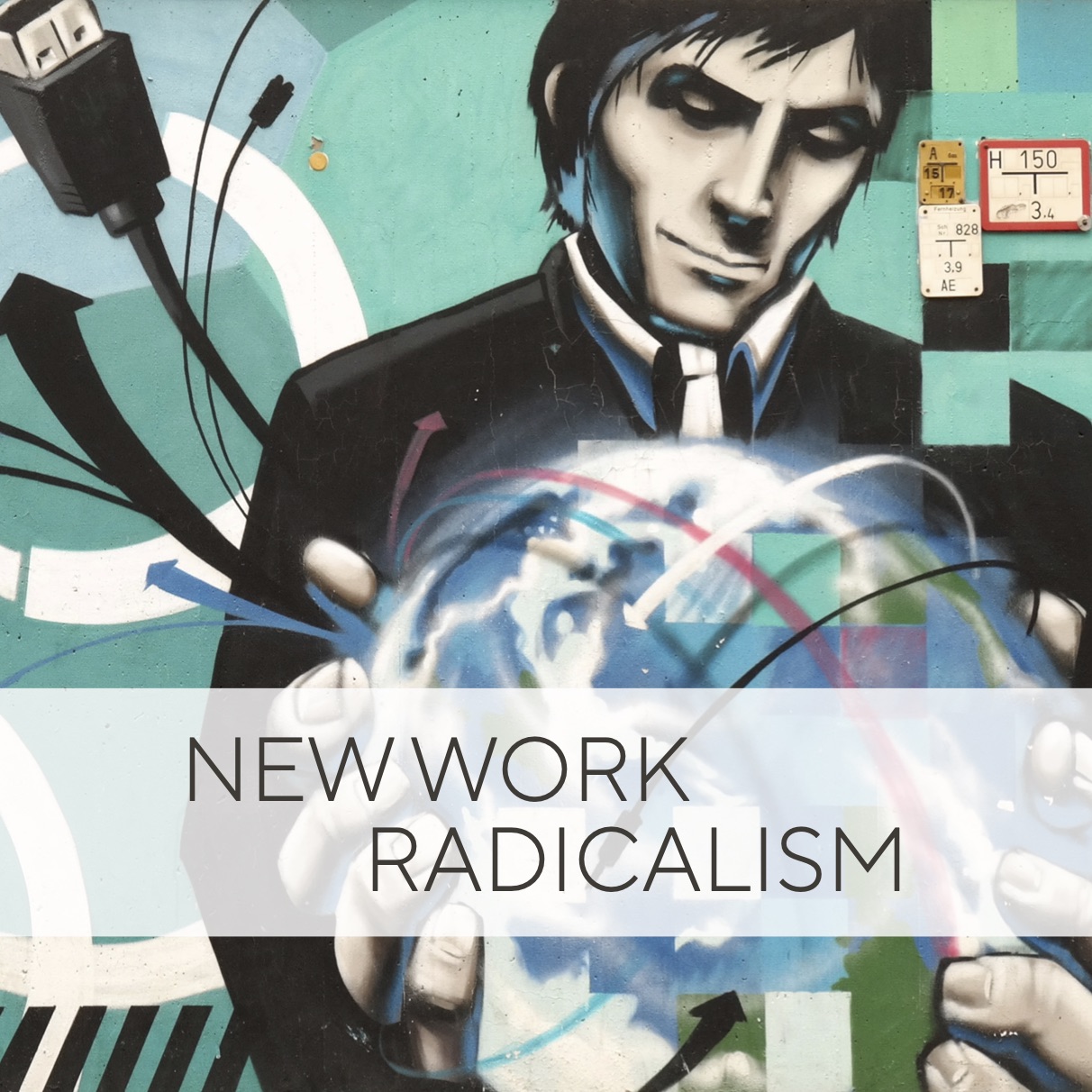New Work Radicalism ist eine Denkhaltung, eine Bewegung, ein Beratungsansatz, der klare und direkte Konsequenzen aus der Krise der Arbeit zieht. Der Ansatz, den ich gemeinsam mit meiner großartigen Kollegin Liane Stephan von awaris entwickelt habe, versteht sich insofern als radikal (von lat. radix, die Wurzel), als er auf die tiefgreifende und kompromisslose Veränderung von Mindset, Interaktion und Verhalten in komplexen Systemen abzielt.
Die Erfahrungen und Erkenntnisse der letzten Jahre haben gezeigt, dass sich unter dem Stichwort New WorkGrundansätze, Formate und Handwerkzeuge versammeln, mit denen sich Volatilität, Unsicherheit, Komplexität und Ambiguität in der Wirtschaftswelt adäquat begegnen lassen. Jedoch wird New Work bisher vor allem als Schönwetteransatz behandelt: Da, wo man es sich gerade leisten kann, werden Büros neu eingerichtet oder einem Team ein Kreativworkshop gegönnt. Sobald sich jedoch härtere Zeiten andeuten oder gar in den Krisenmodus geschaltet werden muss, kehrt man zu den bewährten Mustern des „old work“ zurück: Starke Hand, klare Ansage, effizienter Durchgriff. Die als „weich“ angesehenen New Work-Themen passen dann nicht mehr…
New Work Radicalism denkt genau umgekehrt: Die aktuellen Krisensymptome deuten darauf hin, dass die Arbeitswelt noch stärker und exponentiell an Dynamik und Komplexität gewinnen wird. Dabei ist immer zu verstehen, dass Wandel und Krise zwei Seiten einer Medaille sind. Um Wandel aktiv zu gestalten, bedarf es der kollektiven Weisheit einer Organisation. Erweckt wird diese nur, wenn Kognition, Emotion und Körper gleichermaßen Raum und Beachtung zukommen. Achtsamkeit, Gewahrsein und „Wohl-Gespanntheit“ bilden dabei die eine Wurzel einer neuen Unternehmenskultur, in der Mitarbeitende genügend mentale Kapazitäten haben, um mit ihrer inneren Weisheit Komplexität kreativ zu begegnen. Die andere Wurzel bildet Agilität als mentale und organisationale Lebendigkeit, um beweglich auf Dynamiken und neue Anforderungen reagieren und wertstiftende Veränderungen proaktiv gestalten zu können.
Mit dem Ruf nach New Work Radicalism fordern wir dazu auf, mit der konsequenten Intensivierung von Achtsamkeit, Agilität und intrinsischer Motivation auf die Krise der alten Arbeitsmodelle zu antworten. Wir sind überzeugt, dass Organisationen nur so ganzheitliche Resilienz erreichen und die Krise meistern können.
Radikalität fordern wir in den folgenden vier Bereichen:
1. RADICAL PURPOSITIVITY: Focus on the greater good. Know your why, explore it with unconditional curiosity and embody it in all actions.
2. RADICAL COEFFICIENCY: Foster and demand clarity and full accountability. Achieve ambitious targets with highest possible collective performance.
3. RADICAL COM-PASSION: Empathize with the other for their benefit while being fully self-aware. Love people, love yourself.
4. RADICAL ECOISM: Let go of your ego. See the whole and discover its interdependence and changeability.
Hier gibt es das gesamte Manifest als Broschüre.
Join the Movement!
Liane Stephan (awaris) und Johannes Ries
New Work Radicalism (latin radix, the root) is an uncompromising approach that causes a shift in mindset, behaviour and interaction in complex systems. It Is a new way of thinking about work and organisational life – reflecting both the emerging realities of the digital age and deep insights into human nature.
For a number of years the umbrella term New Work has been used to encapsulate new working styles, as well as formats and tools that help us cope adequately with volatility, uncertainty, complexity and ambiguity in modern economy. Generally thought, New Work, has been thought of as a fair weather approach: when times are good, then we can refurnish the office or pay for a a creativity workshop or try new forms of collaboration. However, when the going gets tough, or we even switch into crisis mode, organizations quickly go back to established patterns of „old work“ like stifling creativity through hierarchies, pushing stress down the organisation and taking vigorous (but often ill considered or unhelpful) actions on top of that. New Workthemes then seem to not fit the needs anymore as they are considered „soft“, if not „weak“…
New Work Radicalism takes this on head on: Current crises are signs of a further (presumably) exponential increase in dynamics and complexity of the modern human work environment. Crisis call us to go forward – not to fall back on old ways – and crisis are an opportunity to really change the way we work. In responding to this change pro-actively, the collective inner wisdom of all members of the organization is needed. Therefore, making room and giving equal attention to cognition, body, and emotion is essential. This kind of mindfulness and awareness builds „the root“ of an agile corporate culture that is characterized by „well-tension“, in which people actually have sufficient mental capacities to encounter complexity with inner wisdom in a creative and efficient manner.
Our call for New Work Radicalism prompts for an intensification of mindfulness, agility, and intrinsic motivation to respond to the crisis of old working models. We see opportunities for deeper interconnection and collaboration – rather than entrechment or silos. We are convinced that holistic resilience can only be reached that way. In this manner, we can master the crisis.
Radicality is necessary particularly in four areas:
1. RADICAL PURPOSITIVITY: Focus on the greater good. Know your why, explore it with unconditional curiosity and embody it in all actions.
2. RADICAL COEFFICIENCY: Foster and demand clarity and full accountability. Achieve ambitious targets with highest possible collective performance.
3. RADICAL COM-PASSION: Empathize with the other for their benefit while being fully self-aware. Love people, love yourself.
4. RADICAL ECOISM: Let go of your ego. See the whole and discover its interdependence and changeability.
Join the Movement!
Liane Stephan and Johannes Ries
